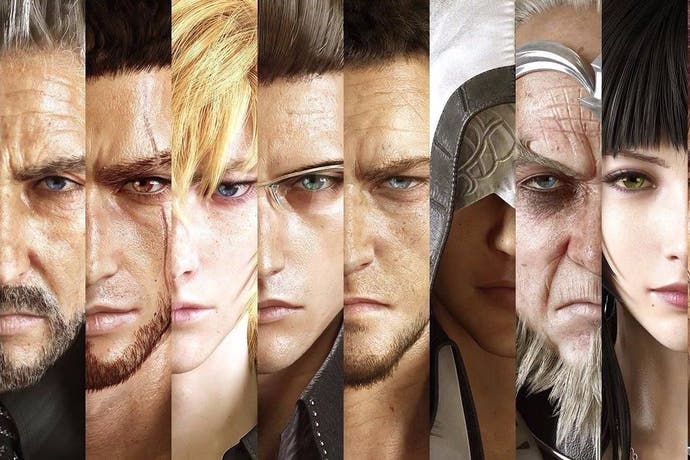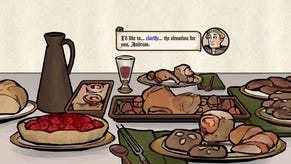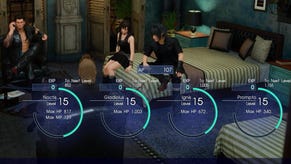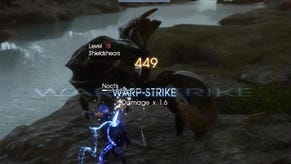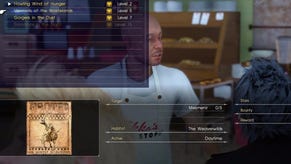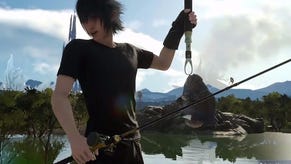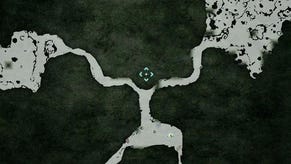Final Fantasy 15 review
Carpool tunnel.
Final Fantasy has always been at its best in its more personal moments. Apocalyptic meteors, time-travelling sorceresses and fishy floating physical manifestations of your sins are all well and good, but they mean little if the story doesn't give you something a bit closer to home to relate to. Finding out it's who you are rather than where you came from that matters, learning to trust other people no matter their background, navigating tricky love triangles and attempting to get the girl even when she's busy conjuring monsters out of living statues - those are the story beats to remember. Stopping the bad guy and saving the world are rarely the most memorable moments from a Final Fantasy game. Characters like Vivi, Nanaki, Cyan and Galuf are the beating heart of these fables, characters in whom we see a nugget of truth or a moment of kinship, whether they're a talking, tattooed wolf-lion thing or not.
Final Fantasy 15, in many crucial ways, understands this. Central to every smaller story it wants to tell is friendship; the kind of coming-of-age friendship that feels like, and often is, the most important thing in the world to those bound by it. It was a brilliantly underrated stroke to frame this Final Fantasy so decisively as a road trip - of course that's what Final Fantasy games always have been - but it proves to be a compelling device that fits this more modernised take on a Final Fantasy universe particularly well. It provides a moreish loop during the open-world sections; roll up to a new outpost, chat to a local tipster to uncover nearby side quests and monster hunts, and then turning in a couple of bounties before settling down for the evening, cooking up some stat-boosting meals with your boys at camp and cashing in the day's EXP.
The open world section, where you're tooling around in your car with your best buds and taking on assorted tasks at your leisure, is where Final Fantasy 15 is at its best. The world, while perhaps smaller than some fans may be expecting, crams an impressive number of activities into its imposing peaks and murky depths. Seek out hidden dungeons in the far-reaches and you'll take on unique bosses to unlock Noct's 13 ancestral Armiger weapons, and in your downtime you can spend some quality one-on-one time with your friends, getting up early in the morning to help Prompto with an impromptu modelling session, or assisting Ignis in stealing his specs back from a naughty black Chocobo hoarder. Different locales come with their own ecology and weather forecasts, and though you'll soon tire of driving the car (GTA this isn't - you have such little control it's often just simpler to have Ignis drive for you), cruising from town to town, spotting nostalgic series references and watching the wildlife pass by with an early Final Fantasy soundtrack twinkling over the car stereo is a cathartic experience for old-school fans.
Combat is, on the whole, a pleasant surprise - at turns deeply satisfying while frequently frustrating. Noctis' ability to summon weapons from mid-air, switch them out at any moment and zip around the battlefield by way of warp-striking is fast-paced and empowering, and that the development team have created an action-based battle system that still feels true to the Final Fantasy spirit is an achievement in itself. There's a spectacle in seeing your party working together to perform Link Strikes and Blindsides, but a totally unreliable lock-on button and a camera that simply cannot keep up with you - particularly where boss battles are concerned - often try their best to spoil the fun. A more intuitive way of keeping your team healed than frequently pausing the action to administer individual curative items would have been welcomed too - take a tip from me and acquire Ignis' Regroup Technique early on to save yourself a fortune in Hi-Potions.

Magic, however, is under-utilised. Your lack of control over where the other characters will be at any given moment in battle means that throwing a spell into the mix is often not worth the risk, given that it negatively affects anyone it hits. And since spells are finite, equipping them to a character that isn't Noctis is finicky business - you won't be notified when those spells are depleted and you have to craft and equip more, for example. I focused almost exclusively on switching weapons and just incorporating those with elemental effects when necessary, and never felt at a strategic disadvantage.
Other, more character-led additions to gameplay are where Final Fantasy 15 shines brightest. The cooking feature, while simple, is brilliantly engaging, and I often found myself going well out of my way to harvest new ingredients or track down new recipes for Ignis to master. The stat boosts that these meals provide are almost incidental to the opportunity of salivating over new, painstakingly realised concoctions. Prompto's photography skill, while not as interactive, is similarly endearing and is genuinely quite moving later in the game, as new modes become available for the guys to take procedurally generated cute selfies that just happen to be prior to important, emotional scenes. It's a clever touch that these photo collections are reviewed at the end of the day, too, as it means that you're often looking at these moments of light-hearted innocence with the benefit of hindsight. That the characters look over the photos together with you also adds touching little voiced insights to their thoughts and feelings at key story beats.
It's harder for fully voiced, realistically rendered characters to be quite as endearing to players as the pliable party members of old, but all four of Final Fantasy 15's main party members are both likeable and familiar, bolstered by surprisingly well-scripted dialogue and voice acting that make light of their fantastical surroundings in a deliciously self-referential way that feels fresh for an FF title. You believe in their friendship, and you believe that suddenly freed of their responsibilities in the city and given a badass car to cruise around in, they're having the time of their lives.
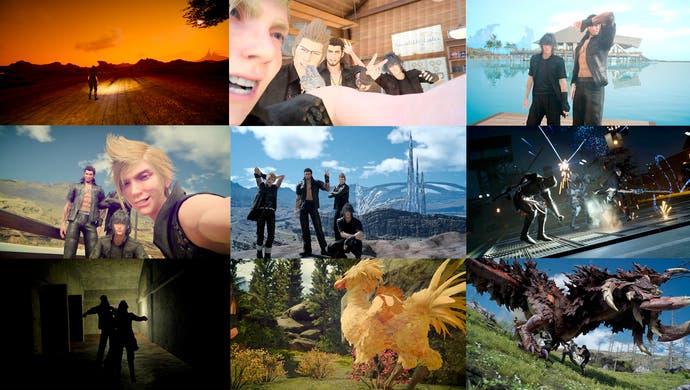
A drawback of having all four of the main party members so thoroughly fleshed out, however, is that every other individual introduced in the game feels one-dimensional by comparison. None of the supporting cast are given anything that even remotely resembles a satisfactory story arc, and characters originally touted to be important in the endless promotional materials and trailers for the game are completely dropped later in the story, long before we're given a chance to care about or even properly meet them. No-one seems to have any motivation for doing the things that they do, other than furthering the plot, and that goes double for the utterly unremarkable antagonist, who lacks even a fraction of the magnetism of a Kefka or Sephiroth.
Final Fantasy 15's biggest problem is that despite a strong core cast it's all far too vague, lacking the messy, human appeal of previous titles, which could distil celestial struggles and global plights down to something much more real and relatable. Final Fantasy 15 talks in sweeping generalisations and barely stops to tally up the human cost. When it does, it fumbles; there are several moments later in the game when you're given an important bit of information regarding a major character, but the wider context is never addressed and, in one instance, it's never brought up or mentioned again. It's disappointing how 15 creates some of the most well-rounded characters in a Final Fantasy in a long time time, but seems entirely unsure about what to do with them.
The plotting is quite bafflingly bad; nothing of note actually plays out in front of you for most of the game. In fact, most of the inciting events take place either off-camera or in Kingsglaive, the full-length tie-in feature film. Having watched both that and the Brotherhood anime, which also serves as a prequel to the game, I was able to follow what was going on, but I have a strong feeling anyone who doesn't go in armed with all that exposition will be at a distinct disadvantage. It seems as though Square Enix sensed this too, making a last-minute addition of quick cuts of Kingsglaive and the Omen CG trailer to a few key cutscenes, which truthfully feel like they will only confuse things further for anyone unaware of their origins, as they very clearly do not belong in the game. These moments of exposition should have been a priority and a case of show, not tell within the main event itself, surely?
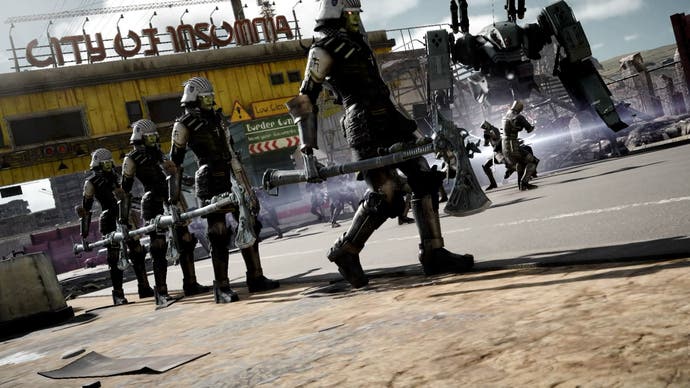
That's the main, repeating issue with Final Fantasy 15; it never lives up to the grandiose expectations it sets for itself. Boss fights become gruelling battles of endurance against towering HP sponges - and nothing dulls the sheen of an an epic moment quite like dragging it out for far too long. Summons, despite their size, play a smaller role than you might expect. You can't call upon them at any time you like, as with previous titles; instead certain conditions must be met before they become available. This means that you can go through an entire major boss fight, where an Astral's help in whittling down a health bar would have been heartily welcomed, without ever having the option of calling upon them, but then later they'll make an appearance during some small-fry skirmish with a handful of imperial soldiers out on the open-world map. Granted, it certainly makes their presence all the more impressive when they do decide to show up, but it isn't the most practical of systems.
And yes, Final Fantasy 15 does become pointedly linear in its later stages. Yet it isn't the end of the world; there's still plenty to do away from the main questline, and the opportunity is there to pursue other challenges both before and after the final credits roll. While still taking time to indulge in a fair amount of side quests and hunts, I wrapped up the main storyline in just under 30 hours, and 10 hours after that I'm still finding plenty of other things to do back in the open world. Let me be clear, though - that the latter stages of the game are weaker is not because they are linear, but because they are disappointingly sparse, with several hours dedicated to Noctis moving through boring, cramped, windowless corridors of repeating assets and enemies. It feels counter-intuitive for Square Enix to have created such an engaging and beguiling world for players to care about, only to completely isolate you at a crucial story juncture. You could argue that this is intentional, that by stripping everything back players are forced to focus on the main narrative (and Square Enix itself has claimed this), but the fact is that this long stretch simply isn't fun, and accompanied by an omnipresent villainous voiceover which regularly repeats lines, the whole sequence feels rather rushed and cheap - an afterthought to the lush, exciting open plains of Leide and Duscae. It's one of the few times throughout Final Fantasy 15's running time that the tortured, ten-year development cycle makes itself painfully obvious.
This troubled history is one of the reasons Final Fantasy 15 is so difficult to pin down. For a series universally known and loved for its emphasis on storytelling, can I recommend a Final Fantasy game despite its unsatisfying story? Instinctively I'd say no, but even as someone who prized the narratives of previous games I still found myself going back to 15's early stages to seek out new challenges after I'd concluded the main campaign. And it's clear that Final Fantasy 15 benefits from a vision, one that emboldened its developers to try new things and reinvent a series while reclaiming the scale that its most ardent fans are used to. In chasing that scale the bigger picture can sometimes get a little obscured, but importantly Final Fantasy 15 retains that love of smaller stories, the ones that often prove to be so much more memorable.
